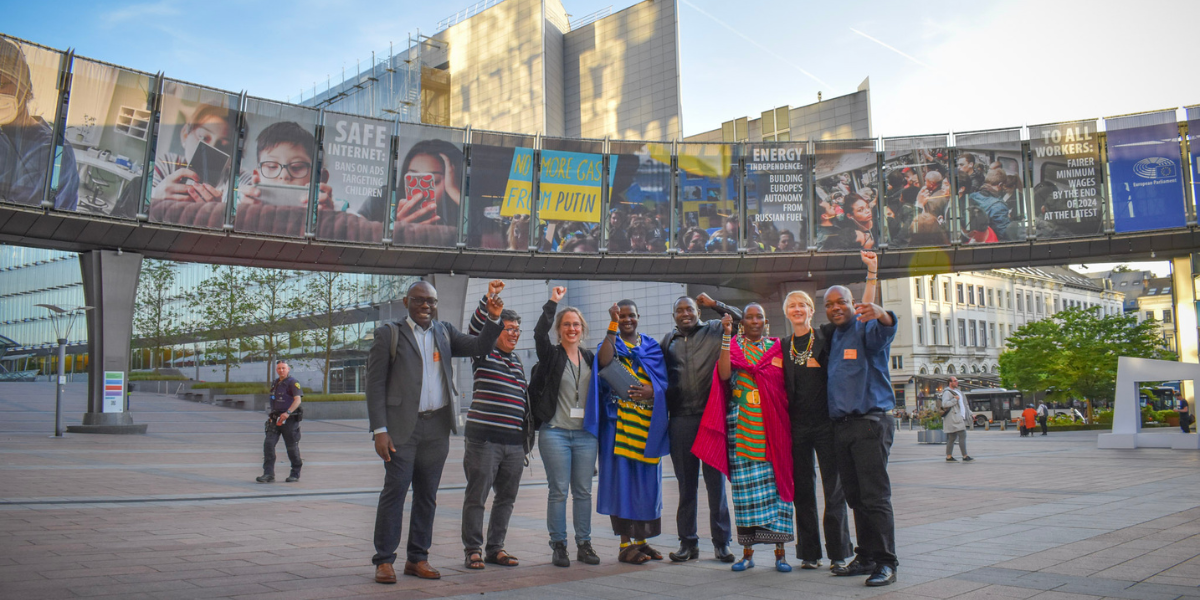Maasai Delegation meets with European Governments and Politicians on Eviction Crisis
(EUROPE) A Maasai delegation concluded a two-week tour in Europe, where they engaged with government and European Union (EU) representatives, faith-based and civil society groups across Germany, Austria, Italy and Belgium. The delegation aimed to secure international support against the ongoing evictions from their homeland in the Loliondo and Ngorongoro areas of Arusha Region, Tanzania. The advocacy tour generated an important wave of solidarity from European counterparts.
The eviction crisis is forcing tens of thousands of Maasai pastoralists from their ancestral land, disrupting their traditional lifestyle, and posing a threat to their very existence. The delegation brought their plight to the international stage as their freedom of speech is severely constrained in Tanzania.
They also drew attention to the indirect relationship between European funding which supports nature conservation projects in Tanzania, and resulting human rights violations suffered by the Maasai people. The Tanzanian Government justifies these evictions as nature conservation efforts; however, the Maasai delegation emphasised the existence of other interests, including tourism and trophy hunting. It called on the EU to condition their funding on the respect for human rights, stating: “If you cannot guarantee that your money does not support human rights violations, keep it!”
During their meetings in Germany, the Maasai delegation appealed to the Ministry of Development Cooperation, the Foreign Ministry and the Frankfurt Zoological Society to uphold human rights in their projects in Tanzania. They also called for an end to the forced evictions. While the Frankfurt Zoological Society denied their involvement, the German government officials assured them they will present their concerns to the Tanzanian Government in future intergovernmental talks. Moreover, they agreed to raise this issue through their Embassy in Dar es Salaam as a priority. The German Parliament’s Human Rights Committee pledged to continue to follow the situation through parliamentarian visits to Tanzania and close monitoring of the German government’s actions.
The delegation’s visit to Austria yielded similar commitments, with the Ministry of Environment and the Ministry of Foreign Affairs pledging to monitor the situation, while the Austrian Ambassador to Kenya also announced plans to meet with the Maasai delegation. The delegation also travelled to Rome and requested the Vatican to help them voice their outcry.
The EU, which annually allocates €168 million in international partnerships with Tanzania, was the final stop on the delegation’s tour. The European Commission, the European External Action Service (EEAS) and the EU Special Representative for Human Rights, Eamon Gilmore, assured the delegation that they are aware of the issues and will continue to raise the human rights violations during their dialogues with the Tanzanian Government. Several Members of the European Parliament also committed to exploring ways to rapidly trigger a humanitarian response.
The Maasai delegation also engaged in an open dialogue with the Tanzanian Ambassador to the EU at a roundtable in the European Parliament. During the event, they refuted the claims presented by the Tanzanian Government representatives. In response, the Tanzanian Ambassador denied the accusations and asserted the government’s transparency, and extended an invitation to the UN Special Rapporteur on the Rights of Indigenous Peoples to visit Tanzania in 2024 – which has not been possible in the last years. Furthermore, the Ambassador reassured the Maasai delegates that their safety would not be compromised upon their return.
The delegates’ courage to openly discuss their situation in Europe, despite the risk of reprisals, resonated among a broad array of European political leaders, institutions, civil society organisations. A wider public is now becoming more aware that conservation and tourism on Maasai land should be in the hands of the Maasai themselves. As the Maasai delegates return to Tanzania, they carry with them a renewed hope for international solidarity and action against the current eviction crisis.
This tour was supported by a group of NGOs and civil society organisations that stand in solidarity with the Maasai people. They work to raise awareness, foster international solidarity and provide a platform for the Maasai people, who are increasingly being criminalised.
For media inquiries, please contact:
– Edward Porokwa, PINGO’s Forum: +255 754 479 815, eporokwa@pingosforum.or.tz
– Joseph Oleshangay, Human Rights Lawyer: +255 769 637 623, joseshangay@report2018
– Martin Lena, Survival International: +33 142 41 47 62, ml@survivalinternational.fr

This activity is co-founded by the European Union. The contents are the sole responsibility of the organisers and the speakers and can in no way be taken to reflect the views of the European Union.

